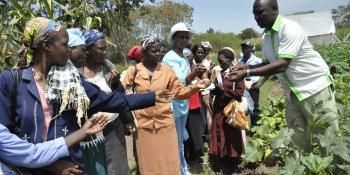"If I don't have my health, why bother with agriculture and climate change?"

by Caity Peterson
Abrar Chaudhury isn’t a fan of top down adaptation costing. “Top down, purely econometric approaches usually way underestimate the true costs of adaptation,” he says. But he also says that a bottom up, community directed approach isn’t the absolute answer either. “The real story,” he asserts, “is in the difference between the two.”
Chaudhury’s work involves the use of a new community adaptation prioritization and planning tool called Participatory Social Return on Investment (PSROI). PSROI builds on traditional Social Return on Investment methods – which normal focus on economic analysis of pre-determined interventions – by integrating a participatory, community-driven component.
At a meeting of the CGIAR Research Program on Climate Change, Agriculture and Food Security (CCAFS) just prior to the Second Global Conference on Agricultural Research for Development (GCARD2) in Punta del Este, Uruguay, Chaudhury explained how discrepancies between external climate change adaptation costing efforts and community-based costing efforts like PSROI can reveal what the people affected by climate change truly value.
In Kochiel, Kenya, for example, agricultural matters are all but a secondary concern. The people of Kochiel need a medical clinic. Their view: if they don’t have their health, why bother with agriculture? What’s more, why bother with climate change?
“If I were to go into that community and start pushing some other adaptation intervention, it would totally fail,” said Chaudhury. Looking at why community values are potentially different from technical expert values can help pinpoint factors that might be preventing the success of adaptation interventions.
More importantly, it can point researchers and policymakers towards changes that might actually…make a difference!
Attendees of the GCARD2 conference this week will be looking to incorporate Chaudhury’s PSROI work into a plan of action for agricultural research for development, one that develops the key partnerships necessary to enact meaningful change.
Read more about the PSROI work
Blog stories
What really matters to people experiencing climate change effects?
Publications
Working Paper no. 16. Community-Based Adaptation Costing: An integrated framework for the participatory costing of community-based adaptations to climate change in agriculture by Chase Sova, Abrar Chaudhury, Ariella Helfgott, Caitlin Corner-Dolloff
Stay updated with happenings at the GCARD2 conference on the GCARD2 Social Reporting Platform.
Caity Peterson is a visiting researcher based at the International Center for Tropical Agriculture (CIAT) in Colombia, working on CCAFS Theme 1: Adaptation to Progressive Climate Change. To get more updates, follow us on Facebook, and Twitter @Cgiarclimate.


